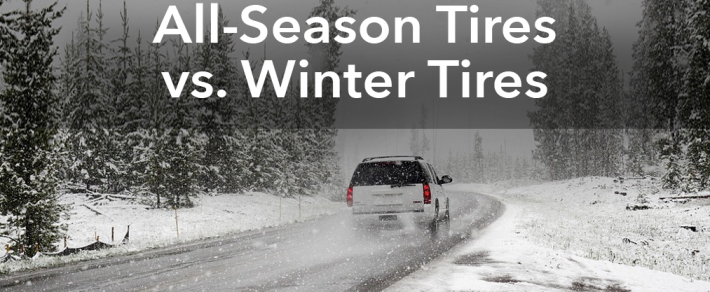We’re sorry to say it, but it’s that time again. The cool breeze is in the air. Pumpkin spice lattes are being ordered. And your sandals are tucked away for good. Now it’s time to revisit the age-old question: this winter season should you invest in winter tires or all-season tires?
Of course, there are many determining factors and the answer is different for everyone (unless there are laws about what type of tires you need in your state). Let’s explore.
The Bottom Line: Winter Tires Perform Better
There is no arguing, when it comes to winter weather, winter tires perform better. All-season tires cannot be “just as good as” winter tires. Winter tires offer more traction and grip ice better. They don’t just outperform in winter weather, they also outperform in rain and slush. They’re not just snow tires, they’re winter tires. So, hands down, if you live in a place that drops below freezing more than a handful of days in the year, you should invest in winter tires because they will keep you the safest throughout the winter season.
However, one of the biggest reasons that keeps people from investing in snow tires is the cost. However, people should look at it this way, even if a set of snow tires prevents you from having one accident, they were worth the investment because having to pay for a car to be fixed, or paying medical bills will add up a lot faster.
Who Could Benefit From All-Season Tires?
That’s not to say no one could benefit from all-season tires. All-season tires are usually a hybrid between winter tires and summer tires (or “performance tires”). They are great for climates that experience very few light dustings of snow annually and have little-to-no ice. They do not substitute for genuine winters tires.
Myths About Winter Tires
All that being said, there are a few myths floating around the debate between winter tires and all-season tires. For example, some people think that if they have 4-wheel drive, they don’t need winter tires because the all-wheel-drive will enhance the performance of their all-season tires. That is not the truth. If you live in a climate that has a lot of snow, 4-wheel drive is not a substitute for winter tires. Only winter tires have the tread required for gripping ice and snow.
Another common myth is that winter tires are too loud. That might’ve been the case thirty years ago, but modern winter tires should not be noticeably louder than all-season or summer tires.
A myth that definitely needs debunking is the idea that only two winter tires will suffice. Nothing could be further from the truth, if only half of your car grips the ice or snow when you brake, that leaves the other half susceptible to swinging out. All of the tires on your car need to be the same at all times and seasons.
If you have questions about what tires are the right fit for you and your vehicle, contact McKinney Motor Company. We have all the services and expertise you need to make sure you’re rolling into winter the right way.




